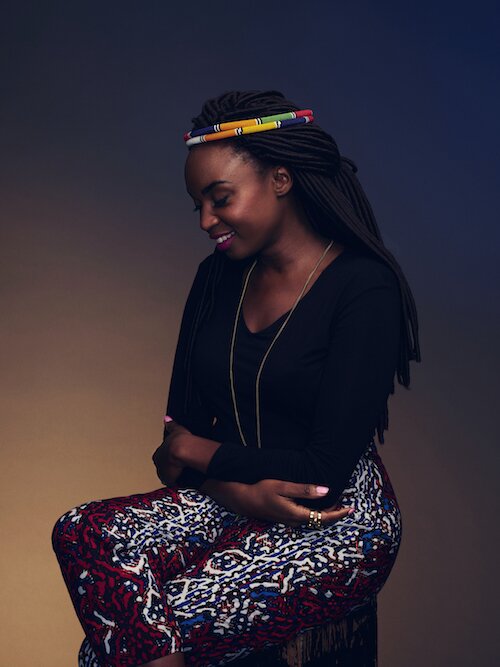By Barbara Matusow
Imagine plugging away for seven years to raise the money for a feature film about two young women who fall in love. And you’re doing it in a country where homosexuality is a crime. [Kenya’s High Court has postponed a ruling until May 24th to remove a century-old colonial law criminalizing gay sex.] But Wanuri Kahiu does not take no for an answer. And while Rafiki, the film she ultimately directed, has been banned in Kenya, it’s been making waves in film festivals around the world. It was a smash in Toronto and it sold out in London. In Cannes, as the first movie from Kenya to be screened there, it received a 6-minute standing ovation. “It was amazing and completely unexpected” Wanuri said in a recent telephone interview from New York. “The kindness, the warmth towards me was extraordinary. I’ve never been so moved by an audience in my life.”
The film portrays the growing friendship which blossoms into romance between two teenagers, set against the backdrop of a virulently homophobic society. Their daring relationship threatens not just their own futures but puts their families at risk as well. After watching the film, I could see that the story was tailor-made for Wanuri, whose films all have featured unconventional, strong women in the leading roles. “We have not even begun to see the multiple, complex aspects of women on screen," she says.
“I am very happy to be presenting women in non-binary leading roles because for so long we have only seen one version of identity—the straight white male version that doesn’t begin to describe the possibilities for being in this world. We need to tell more stories about various identities, the kind that have often been erased and dismissed, so that we have a more complete, wholistic view of ourselves.”

Wanuri also maintains that Africa needs more love stories. “I’m not just talking about love between a man and a woman,” she says. I’m talking about anything that shows tenderness and kindness. It could be a teacher and a pupil or a parent and a child. I’m very keen to show the breadth of humanity on this continent so that we move away from the stereotypes of Africa and let people see that it is a continent of might, and hope, and joy.”
Wanuri, whose 2016 marriage received much attention in Kenya’s press, divides her time between Nairobi and Mombassa, though she is increasingly spending time abroad promoting her film. She grew up in a close-kinit, prominent family in Nairobi. Her mother was Kenya’s first pediatrician. Her father is a businessman. Wanuri did her undergraduate studies at the University of Warwick in Coventry England and obtained a Master of Fine Arts degree in producing and directing at the University of California in Los Angeles. But she has hardly turned her back on her roots in Africa. She is the co-founder of Afrobubblegum, which she says seeks to promote “fun, fierce, and frivolous African art.” “We are working at commissioning new work,” she says. “It’s still quite new, but we’re hoping to curate and develop more African films.”
Wanuri is still intent on having her film shown back home. She is suing the Kenyan Film Classification Board, contending the ban on the film violated her constitutional right to free speech. (The board lifted the ban for a week in order to qualify for an Oscar in the 2018 foreign language category.) She is also suing the board for $85,000 to compensate for projected lost revenues from a local theatrical run. But worldwide theatrical distribution could soon make up for those revenues.
Washington audiences will have an opportunity to see “Rafiki” for themselves during Filmfest DC, where it is featured as part of the Justice Matters series. (2020 One Woman One Vote Festival, commemorating 100 years since women won the right to vote in the U.S., is co-presenting the Justice Matters presentation of Rafiki with support from the Center for Black Equity, and DC Black Pride.) Rafiki won’t be the last time film-goers hear about this talented young director. Her next directorial endeavor The Thing About Jellyfish is an adaptation of the acclaimed novel of the same name, and will star Millie Bobby Brown in the leading role. Wanuri is also set to direct Wild Seed” for Amazon Prime Video, a drama series based on the first book in Octavia E. Butler’s acclaimed Patternist sci-fi series; Viola Davis and Julius Tennon’s JuVee Productions will produce, and award-winning sci-fi novelist Nnedi Okorafor will co-write with Wanuri.
Wanuri raised the money for Rafiki the hard way, cobbling together a series of grants, including a sizeable grant from the European Union. Now, with Rafiki slated for theatrical distribution in selected cities in the United States later this year and all the tantalizing projects in her future, she no longer has to go hat in hand to raise money. “Hopefully,” she says, “ it won’t take seven years to make a film the next time around.”
ABOUT THE AUTHOR
Barbara Matusow is a veteran journalist who last served as a senior writer at Washingtonian Magazine

